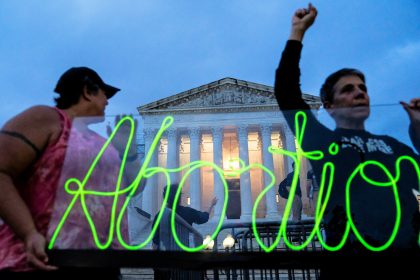Tennessee Liquor Law That Barred Outsiders From Market Struck Down

WASHINGTON – The U.S. Supreme Court struck down a Tennessee law Wednesday that requires an individual to live in the state for at least two years to be eligible for a license to sell liquor.
At issue in the case was the authority granted to states to regulate alcohol sales by the 21st Amendment, which repealed Prohibition in the United States in late 1933, and the constitutional principle that only Congress, not the states, can regulate interstate commerce.
Writing for the majority in the 7-2 ruling, Justice Samuel Alito Jr. said that while states have considerable latitude when it comes to regulating the sale of alcohol, they can’t discriminate against out-of-state interests.
“The predominant effect of the 2-year residency requirement is simply to protect the Association’s members from out-of-state competition. We therefore hold that this provision violates the Commerce Clause and is not saved by the Twenty-first Amendment,” Alito wrote.
The ruling reaffirmed what the justice called the “negative aspect of the Commerce Clause.”
Also known as the “dormant” Commerce Clause, it prevents the states from adopting protectionist measures, thereby preserving a national market for goods and services.
“But the proposition that the Commerce Clause by its own force restricts state protectionism is deeply rooted in our case law,” Alito said.
Here, the justice appeared to raise some qualms in his own mind with how protectionism should be dealt with in the Constitution. In a footnote, Alito suggests that the dormant Commerce Clause isn’t necessarily a good idea, and that the principle of non-protectionism should be rooted in other clauses.
“But one way or the other, it would grossly distort the Constitution to hold that it provides no protection against a broad swath of state protectionist measures. Even at the time of the adoption of the Constitution, it would have been asking a lot to require that Congress pass a law striking down every protectionist measure that a State or unit of local government chose to enact,” the footnote says in part.
In the end, however, and getting back to the main test of the ruling, Alito concluded, “without the dormant Commerce Clause, we would be left with a constitutional scheme that those who framed and ratified the Constitution would surely find surprising.”
For all this rumination, Justice Neil Gorsuch, simply disagreed, holding in dissent in which he was joined by Justice Clarence Thomas, that the 21st Amendment left the regulation of alcohol to the states.
“Alcohol occupies a complicated place in this country’s history,” Gorsuch wrote. “Some of the founders were enthusiasts; Benjamin Franklin thought wine was ‘proof that God loves us.’ Many in the Prohibition era were decidedly less enamored; they saw ‘liquor [a]s a lawlessness unto itself.’ Over time, the people have adopted two separate constitutional Amendments to adjust and then readjust alcohol’s role in our society.
“But through it all, one thing has always held true: States may impose residency requirements on those who seek to sell alcohol within their borders to ensure that retailers comply with local laws and norms,” the justice continued. “In fact, States have enacted residency requirements for at least 150 years, and the Tennessee law at issue before us has stood since 1939. Today and for the first time, the Court claims to have discovered a duty and power to strike down laws like these as unconstitutional. Respectfully, I do not see it.”
The underlying lawsuit was filed after the Tennessee Wine and Spirits Retailers Association opposed the issuance of licenses to Doug and Mary Ketchum, who moved to Tennessee from Utah, and the national chain Total Wine Spirits Beer & More for a store in Knoxville, Tennessee.
The Ketchums moved to Tennessee because the climate was beneficial to their daughter, who has cerebral palsy.
Initially, two state statutes were the focus of the lawsuit. The first imposed a requirement of two years of residency before obtaining a license, while the second required 10 years of residence in Tennessee before a liquor license can be renewed.
Both residency provisions were struck down by lower courts, and the retailers’ association dropped its defense of the longer requirement.
The association argued that having people in the state for two years made it easier for authorities to do background checks and seize a liquor seller’s financial assets if necessary.
Thirty-five states and the District of Columbia backed the retailers’ association.
The case is Tennessee Wine and Spirits Retailers Association v. Thomas, No. 18-96.
























